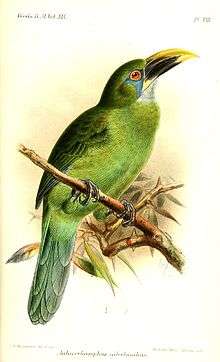Groove-billed toucanet
The groove-billed toucanet (Aulacorhynchus sulcatus) is a species of bird in the family Ramphastidae. It is found in mountains of north-eastern Colombia and northern Venezuela. Its natural habitat is subtropical and upper tropical humid forest and woodland, occasionally also occurring in gardens.
| Groove-billed toucanet | |
|---|---|
 | |
| In Henri Pittier National Park, Aragua State, Venezuela | |
| Scientific classification | |
| Kingdom: | Animalia |
| Phylum: | Chordata |
| Class: | Aves |
| Order: | Piciformes |
| Family: | Ramphastidae |
| Genus: | Aulacorhynchus |
| Species: | A. sulcatus |
| Binomial name | |
| Aulacorhynchus sulcatus (Swainson, 1820) | |
| Subspecies | |
|
See text | |
| Synonyms | |
| |

Taxonomy and systematics
The groove-billed toucanet was originally described in the genus Pteroglossus.
Subspecies
Three subspecies are recognized:[2]
- A. s. sulcatus - (Swainson, 1820): Found in northern Venezuela
- A. s. erythrognathus - Gould, 1874: Formerly considered as a separate species. Found in north-eastern Venezuela
- Yellow-billed toucanet (A. s. calorhynchus) - Gould, 1874: Formerly considered as a separate species until 2012.[3] Some other authorities still treat it as a separate species.[4] Found in north-western Venezuela and north-eastern Colombia
Description
It has a total length ca. 35 centimetres (14 in) and it weighs 150–200 grams (5.3–7.1 oz).[5] It is, as are other members of its genus, mainly green. The throat is white (or pale bluish in the subspecies A. s. erythrognathus) and the ocular skin is blue. The bill is black with maroon markings, but the maroon is replaced by yellow in the yellow-billed toucanet. This distinctive subspecies is found in the western part of the species' range, but is vocally similar to the other subspecies and hybrids are known from the region where it comes into contact with A. s. sulcatus. Genetic evidence suggests they should remain as subspecies of a single species.
It is generally fairly common in its range, and therefore considered Least Concern by BirdLife International. It occurs in several protected areas such as the Henri Pittier National Park in Venezuela.

References
- BirdLife International (2012). "Aulacorhynchus sulcatus". IUCN Red List of Threatened Species. 2012. Retrieved 26 November 2013.CS1 maint: ref=harv (link)
- "IOC World Bird List 6.4". IOC World Bird List Datasets. doi:10.14344/ioc.ml.6.4.
- "Species 3.1-3.5 « IOC World Bird List". www.worldbirdnames.org. Retrieved 2016-11-07.
- "Aulacorhynchus calorhynchus - Avibase". avibase.bsc-eoc.org. Retrieved 2016-11-07.
- Short, Lester L.; Horne, Jennifer (2001). Toucans, Barbets & Honeyguides. Oxford University Press. ISBN 0-19-854666-1.
- Bonaccorso, E., Guayasamin, J. M., Peterson, A. T., and Navarro-Sigüenza, A. G. (2011). Molecular phylogeny and systematics of Neotropical toucanets in the genus Aulacorhynchus (Aves, Ramphastidae). Zoologica Scripta, 40. doi:10.1111/j.1463-6409.2011.00475.x
- Restall, R., Rodner, C., and Lentino, M. (2006). Birds of South America. Vol. 1. Helm, London. ISBN 0-7136-7242-0
External links
- Groove-billed Toucanet on the Internet Bird Collection
- Photo-High Res; Article tropicalbirding.com
- Groove-billed Toucanet photo gallery VIREO
